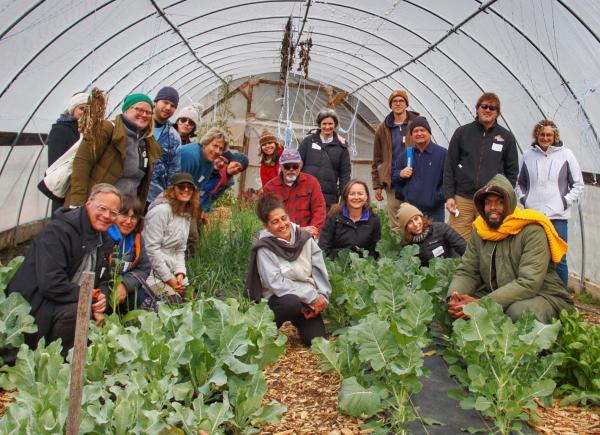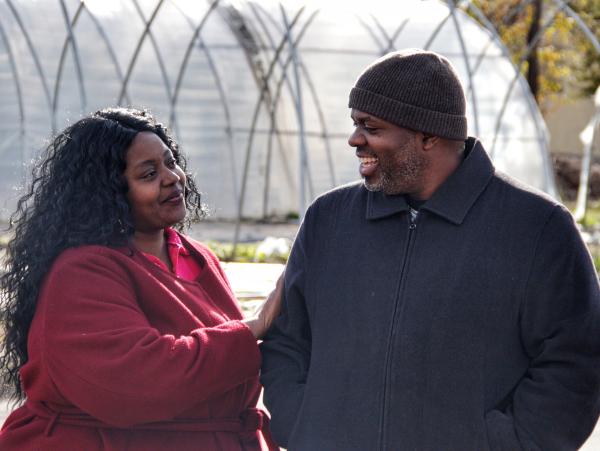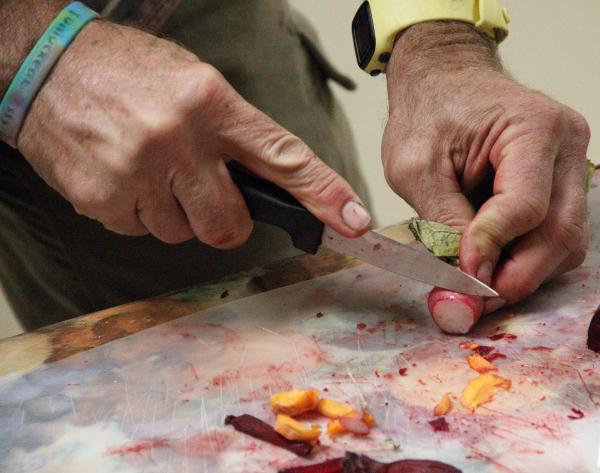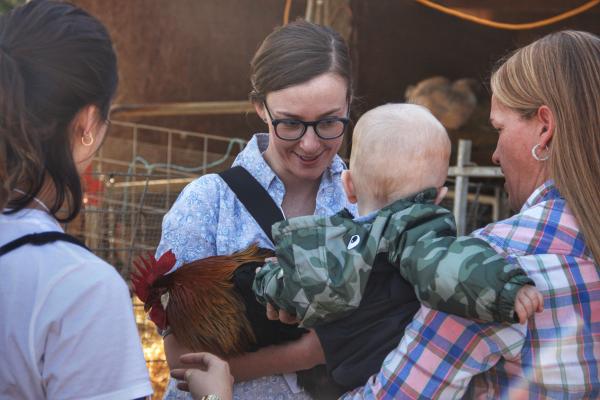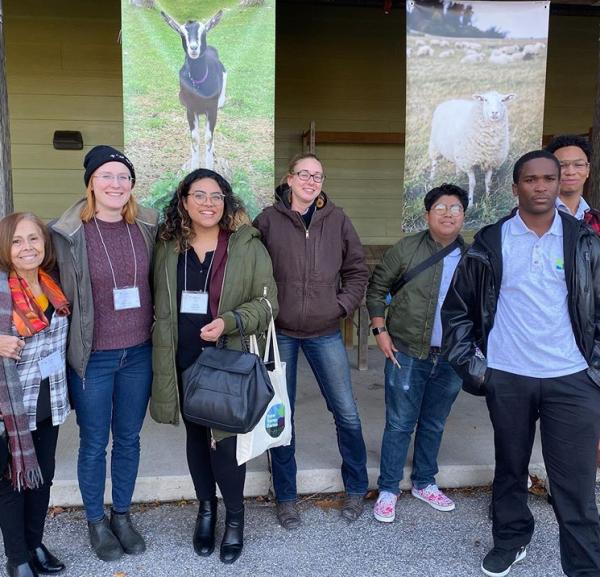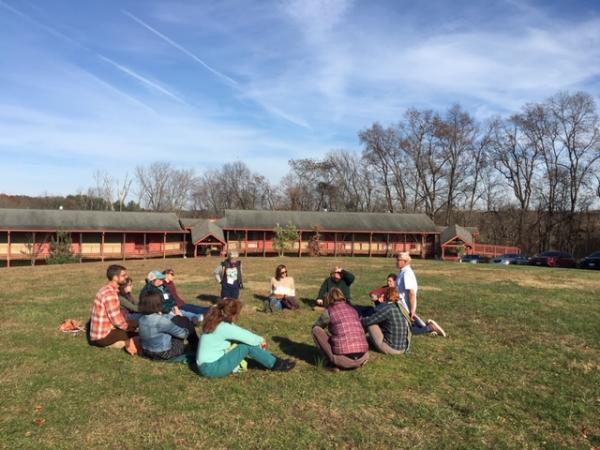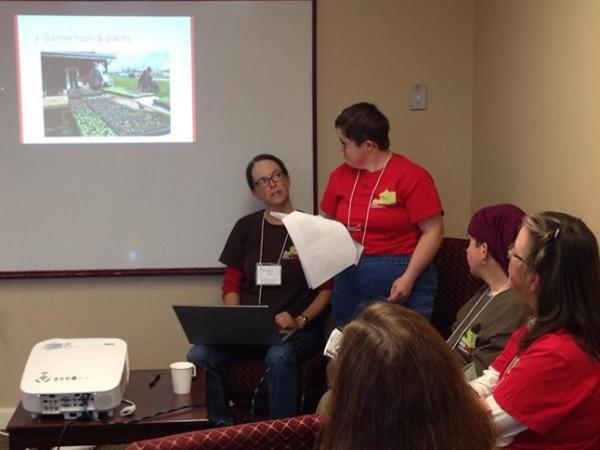Innovations at Farm-Based Education Conference
Farm-based education has emerged as a bright light in the story of agriculture today, where farmers face enormous challenges, and people grow increasingly disconnected from the land we depend on. At the 7th National Farm-Based Education Conference this November, that light was shining strong. Nearly 300 farm-based educators gathered with peers to share ideas, build friendships, and reflect on their evolving programs. A diverse planning committee and a group of wise and creative guest advisors put together a conference program that included challenging topics and innovative practices. In honor of our 7th conference, here are seven of those innovations:
1. Sliding Scale Registration Made Conference Accessible
Professional development conferences are expensive to attend. We knew that we were ready to try something radical to make the conference financially accessible, and with the early support of a few dedicated sponsors, we were able to confidently launch a tiered pricing model. The 2-1/2 day conference, including seven delicious, farm-to-table meals, was available to registrants starting at $60/person. At registration, attendees chose the amount that worked for their budgets ($60-$373/person). After the event, many guests shared that they wouldn't have been able to come, and certainly wouldn't have been able to bring anyone else from their farm, without this financial flexibility. One added, “I'm hoping that by the time the next conference rolls around, I will be able to pay some of the financial assistance forward."
2. More field trips to farms!
The Greater Baltimore Region offered so much to see that we expanded the number of pre-conference field trip days to three. Many participants took full advantage of visits to diverse places. One such site, Whitelock Community Farm (above), is a vibrant open space that grows food and activates community to promote social equity in the neighborhood. Another site, Strength to Love II, is a community-based program in west Baltimore whose 1.5-acre farm employs citizens returning to the community after incarceration. (Pictured below is Dariel Harris, Program Director of Strength to Love II (right) with Assistant Conference Organizer, Taffy Gwitira)
3. Working with Our Hands
On farms, we learn through doing. So it only made sense to carry this pedagogy forward to our conference. At various workshops, attendees prepped and tasted food, helped harvest crops from the Pearlstone Farm, and made upcycled plant pots. One evening, attendees brought a variety of DIY projects to a Farm Craft Share Faire, where folks could make felted flowers, naturally dyed bookmarks, teabags, evergreen corsages, and more. Whether felting, chopping, or joining together with song, we used our hands for learning throughout the conference.
4. We Stayed on a Farm
The Pearlstone Center is a retreat center and working farm, and more than 120 attendees stayed in its cabins and lodges. Attendees were nourished with hearty and fresh meals, sourced from the farm as much as possible. Evening campfires, night hikes, and shared spaces immersed participants in the FBEN community, allowing them to connect in ways that could only be possible in this setting.
5. Youth keynote Presenters
Truly listening to young people is an essential part of education. We welcomed one group of young people to share about the Growing Entrepreneurs High School program at the New Haven Land Trust (pictured above). Other students, co-presented a keynote, "Connecting Youth to The Land, Their Heritage and the Future," sharing moving stories about creating the world they want to see by pursuing careers in STEM fields. And the conversation didn't end there. An attendee chatted briefly with one of these students around a later campfire, and said ,“I was blown away by Isaiah’s passion and fierce dedication to saving the world. It rattled loose a sizeable chunk of the artifice of complacency that's settled into my old bones over these long, laborious years. Witnessing his spirit was invaluable to me.”
6. Nurturing the Whole Person
We recognize that our personal wellness impacts how we show up as farm-based educators each day, and we were eager to incorporate wellness opportunities into the conference. These included a guided mindfulness walk, a wilderness awareness practice, laughter yoga, and movement yoga. Healthy, delicious food was offered throughout, and daily caucus spaces gave LGBTQ+ and BIPOC (Black, Indigenous, People of Color) farmers and farm-based educators time to gather, plan, and support one another.
7. A Social Care Farming Theme for Many Workshops
Social care farming brings together farmers, social service providers, and community members who use farming and farm-related activities to promote therapeutic intervention, employment, meaningful activity, and/or community connection for marginalized and vulnerable populations. After organizing a successful Social Care Farming summit in 2018, Red Wiggler Community Farm (above, presenting a workshop), was excited to invite their community to our conference for further networking and learning. Social Care Farming became one of eight workshop themes, which also included Farm to School (and Camp!); Seeding Community; and Creating and Sustaining Your Organization.
What's next?
First, gratitude. We are so thankful to all our field trip hosts, and to all who made the trip to Maryland to join this vibrant, ever-expanding learning community. As one person summed it up, "It was wonderful to spend three days with enthusiastic peers exploring places devoted to and manifesting such wonderful work. The Pearlstone days were amazing--so full of the presence of the hopeful, living work we are all engaged in."
Next up, the FBEN is exploring how to network regionally and thematically in a meaningful way. And where and when will the next conference be? Attendees cast informal votes and showed strong interest in gathering in Michigan, Colorado, California, North Carolina, Washington State, and other places.
As we consider locations for the 2021 or 2022 conference, we hope you'll reach out about partnering on smaller programs!
The Farm-Based Education Network is nested at Shelburne Farms, where a team supports FBEN in fulfilling its mission to inspire, nurture, and promote farm-based education.

